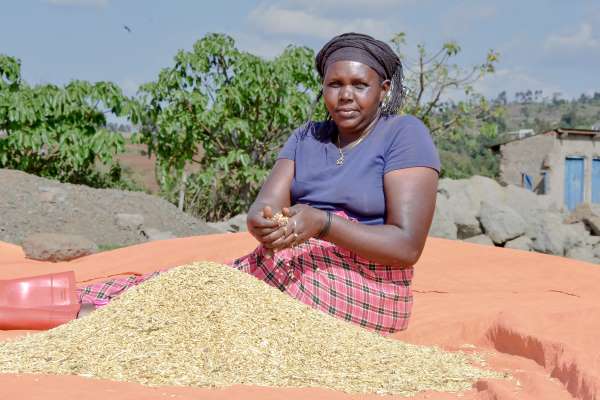Today, 30 March, the Southern African Faith Communities’ Environment Institute (SAFCEI) joins civil society leaders across Africa to brief U.S. congressional aides about the Alliance for a Green Revolution in Africa (AGRA) and its impact on smallholder farmers, and ultimately on food systems and food security in Africa. The briefing takes place on Wednesday, March 30, 9:30-10:30 am EDT/13h30-14h30 pm GMT.
According to SAFCEI’s Executive Director Francesca de Gasparis, who will be presenting, “The impact of Covid has made bare the growing problems with our food systems in Africa, echoed by the findings in recent studies on the negative impact of AGRA. The opportunity to brief U.S. congressional aides will shine light on the myriad of issues facing African farmers, in the name of a so-called ‘Green Revolution’. According to a recent commissioned evaluation by AGRA themselves, this approach is not reaping the claimed benefits and addressing the issues of poverty and hunger.”
SAFCEI’s Food and Climate Justice Coordinator, Gabriel Manyangadze, “As a multi-faith organisation focused on issues of eco and climate justice, SAFCEI works with faith leaders concerned about environmental and climate issues. Faith leaders bring a particularly important perspective, since they represent their communities across Africa, and they see what is happening to the people on the ground, the so-called beneficiaries of these top down misguided initiatives to “improve farming” in Africa. This is how we know what the food crisis looks like for people across Africa.
Just this week, SAFCEI – a member of the Alliance for Food Sovereignty in Africa (AFSA), the largest civil society movement on the continent – sent letters to AGRA donors, calling on them to stop funding AGRA. In its letter to donors, SAFCEI referenced compelling evidence from two independent research studies. The most recent is the latest evaluation report, commissioned by AGRA donors and done by Mathematica. Timothy A. Wise’s Failing Africa’s Farmers: An Impact Assessment of the Alliance for a Green Revolution in Africa (July 2020) showed similar findings. Both reports largely conclude that AGRA has failed to achieve its goals, strengthening the position of faith leaders who are questioning why donors, such as USAID and the Gates Foundation continue to invest large amounts of resources into a process that has not been shown to benefit smallholder farmers nor the environment.
Faith leaders have been raising issues about food security in Africa for some time and they have been debunking the myth that food security is about the quantity of food available, but rather the issue communities are facing are the access to nutritious and affordable food. 500 of faith leaders and organisations signed a letter about their concerns about AGRA. de Gasparis says, “On 18 May 2021, we sent an open letter to the Gates Foundation about its continued funding of AGRA and this approach and we have not had a response to date. Evidence is growing that this model of agriculture is not changing the food system issues in Africa. It is not making us more climate resilient. In fact, it is doing the opposite. This approach of monocultural, industrial, and fossil fuel-based agriculture is not serving the people of Africa, nor creating a climate resilient future for small holder farmers.”
The recent Mathematica evaluation found that “despite reaching over 10 million smallholders through its systems development work, AGRA did not meet its headline goal of increased incomes and food security for 9 million smallholders.” It found that typically younger males benefitted from the AGRA model, instead of the women the programme claims it would benefit. Add to this the shocking statistics that reveal that hunger has increased in the AGRA-target countries – where government policies promote incentivised use of special seed and agro-chemicals – by more than 30%, since 2006.
“So, what does a resilient community look like?” asked de Gasparis. “For us, it is a community that is living in harmony with its local environment and its people, that is sustainable. Agroecological models respect local knowledge systems and ecosystems- these are the models we should look to support, rather than erode good systems that are already in place. We should be looking at how to value the seeds that are familiar to local farmers, who are often rural women, rather than come along with ‘special’ seed, which costs lots of money and which they have to buy each year. How is that a sustainable system for farmers? Instead, we believe that African farmers and governments need the kind of resilient, low-cost alternatives that techniques like agroecology and other low-cost, low-input approaches offer.”
Manyangadze added “What we are seeing is a dangerous attack on communities’ rights to hold and store seed, which are being eroded as a result of changes in government policies that are being pushed by AGRA and funded by institutions like the Bill and Melinda Gates Foundation. Therefore, as people of faith, we say to the Gates Foundation and to the other funders of AGRA, you need to start listening to the smallholder farmers in Africa and rather fund initiatives that seek to work with local farmers and help make them more resilient.”
Director of the Biodiversity and Biosafety Association of Kenya and a member of AFSA Anne Maina says, “We are here to state clearly and categorically that the Alliance for a Green Revolution in Africa does not speak for Africans.”
Researcher Timothy A. Wise says, “After 15 years and one billion dollars in outside funding, AGRA has failed to catalyze a productivity revolution in African agriculture. Farmers’ yields have not grown significantly, poverty remains endemic, and the number of chronically hungry people in AGRA’s 13 focus countries increased 30%. It is time for donors to listen to African farmers and community leaders.”
Donors must rethink Africa’s flagging Green Revolution, new evaluation shows (commentary)
https://safcei.org/wp-content/uploads/2022/03/SAFCEILetterAGRAFunders2022.pdf








